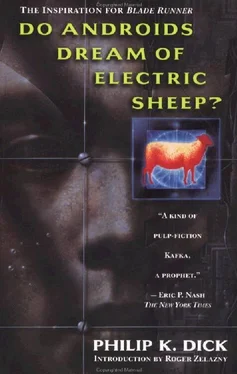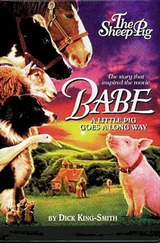Appearing beside him, her long nightgown trailing wispily, Iran shut off the TV set. “Okay, I give up; I’ll dial. Anything you want me to be; ecstatic sexual bliss—I feel so bad I’ll even endure that. What the hell. What difference does it make?”
“I’ll dial for both of us, Rick said, and led her back into the bedroom. There, at her console, he dialed 594: pleased acknowledgment of husband’s superior wisdom in all matters. On his own console he dialed for a creative and fresh attitude toward his job, although this he hardly needed; such was his habitual, innate approach without recourse to Penfield artificial brain stimulation.
After a hurried breakfast—he had lost time due to the discussion with his wife—he ascended clad for venturing out, including his Ajax model Mountibank Lead Codpiece, to the covered roof pasture whereon his electric sheep “grazed.” Whereon it, sophisticated piece of hardware that it was, chomped away in simulated contentment, bamboozling the other tenants of the building.
Of course, some of their animals undoubtedly consisted of electronic circuitry fakes, too; he had of course never nosed into the matter, any more than they, his neighbors, had pried into the real workings of his sheep. Nothing could be more impolite. To say, “Is your sheep genuine?” would be a worse breach of manners than to inquire whether a citizen’s teeth, hair, or internal organs would test out authentic.
The morning air, spilling over with radioactive motes, gray and sun—beclouding, belched about him, haunting his nose; fie sniffed involuntarily the taint of death. Well, that was too strong a description for it, he decided as he made his way to the particular plot of sod which he owned along with the unduly large apartment below. The legacy of World War Terminus had diminished in potency; those who could not survive the dust had passed into oblivion years ago, and the dust, weaker now and confronting the strong survivors, only deranged minds and genetic properties. Despite his lead codpiece the dust—undoubtedly—filtered in and at him, brought him daily, so long as he failed to emigrate, its little load of befouling filth. So far, medical checkups taken monthly confirmed him as a regular: a man who could reproduce within the tolerances set by law. Any month, however, the exam by the San Francisco Police Department doctors could reveal otherwise. Continually, new specials came into existence, created out of regulars by the omnipresent dust. The saying currently blabbed by posters, TV ads, and government junk mail, ran: “Emigrate or degenerate! The choice is yours! “ Very true, Rick thought as he opened the gate to his little pasture and approached his electric sheep. But I can’t emigrate, he said to himself. Because of my job.
The owner of the adjoining pasture, his conapt neighbor Bill Barbour, hailed him; he, like Rick, had dressed for work but had stopped off on the way to check his animal, too.
“My horse,” Barbour declared beamingly, “is pregnant.” He indicated the big Percheron, which stood staring off in an empty fashion into space. “What do you say to that?”
“I say pretty soon you’ll have two horses,” Rick said. He had reached his sheep, now; it lay ruminating, its alert eyes fixed on him in case he had brought any rolled oats with him. The alleged sheep contained an oat-tropic circuit; at the sight of such cereals it would scramble up convincingly and amble over. “What’s she pregnant by?” he asked Barbour. “The wind?”
“I bought some of the highest quality fertilizing plasma available in California,” Barbour informed him. “Through inside contacts I have with the State Animal Husbandry Board. Don’t you remember last week when their inspector was out here examining Judy? They’re eager to have her foal; she’s an unmatched superior.” Barbour thumped his horse fondly on the neck and she inclined her head toward him.
“Ever thought of selling your horse?” Rick asked. He wished to god he had a horse, in fact any animal. Owning and maintaining a fraud had a way of gradually demoralizing one. And yet from a social standpoint it had to be done, given the absence of the real article. He had therefore no choice except to continue. Even were he not to care himself, there remained his wife, and Iran did care. Very much.
Barbour said, “It would be immoral to sell my horse.”
“Sell the colt, then. Having two animals is more immoral than not having any.”
Puzzled, Barbour said, “How do you mean? A lot of people have two animals, even three, four, and like in the case of Fred Washborne, who owns the algae-processing plant my brother works at, even five. Didn’t you see that article about his duck in yesterday’s Chronicle? It’s supposed to be the heaviest, largest Moscovy on the West Coast.” The man’s eyes glazed over, imagining such possessions; he drifted by degrees into a trance.
Exploring about in his coat pockets, Rick found his creased, much-studied copy of Sidney’s Animal & Fowl Catalogue January supplement. He looked in the index, found colts (vide horses, offsp.) and presently had the prevailing national price. “I can buy a Percheron colt from Sidney’s for five thousand dollars,” he said aloud.
“No you can’t,” Barbour said. “Look at the listing again; it’s in italics. That means they don’t have any in stock, but that would be the price if they did have.”
“Suppose,” Rick said, “I pay you five hundred dollars a month for ten months. Full catalogue value.”
Pityingly, Barbour said, “Deckard, you don’t understand about horses; there’s a reason why Sidney’s doesn’t have any Percheron colts in stock. Percheron colts just don’t change hands—at catalogue value, even. They’re too scarce, even relatively inferior ones.” He leaned across their common fence, gesticulating. “I’ve had Judy for three years and not in all that time have I seen a Percheron mare of her quality. To acquire her I had to fly to Canada, and I personally drove her back here myself to make sure she wasn’t stolen. You bring an animal like this anywhere around Colorado or Wyoming and they’ll knock you off to get hold of it. You know why? Because back before W.W.T. there existed literally hundreds—”
“But,” Rick interrupted, “for you to have two horses and me none, that violates the whole basic theological and moral structure of Mercerism.”
“You have your sheep; hell, you can follow the Ascent in your individual life, and when you grasp the two handles of empathy you approach honorably. Now if you didn’t have that old sheep, there, I’d see some logic in your position. Sure, if I had two animals and you didn’t have any, I’d be helping deprive you of true fusion with Mercer. But every family in this building—let’s see; around fifty: one to every three apts, as I compute it—every one of us has an animal of some sort. Graveson has that chicken over there.” He gestured north. “Oakes and his wife have that big red dog that barks in the night.” He pondered. “I think Ed Smith has a cat down in his apt; —at least he says so, but no one’s ever seen it. Possibly he’s just pretending.”
Going over to his sheep, Rick bent down, searching in the thick white wool—the fleece at least was genuine—until he found what he was looking for: the concealed control panel of the mechanism. As Barbour watched he snapped open the panel covering, revealing it. “See?” he said to Barbour. “You understand now why I want your colt so badly?”
After an interval Barbour said, “You poor guy. Has it always been this way?”
“No,” Rick said, once again closing the panel covering of his electric sheep; he straightened up, turned, and faced his neighbor. “I had a real sheep, originally. My wife’s father gave it to us outright when he emigrated. Then, about a year ago, remember that time I took it to the vet—you were up here that morning when I came out and found it lying on its side and it couldn’t get up.”
Читать дальше








